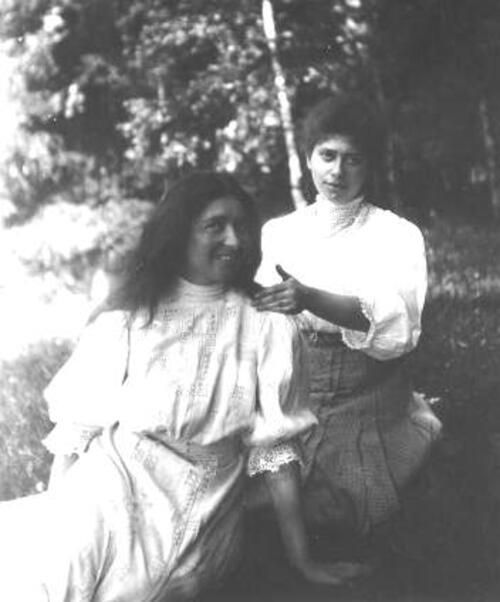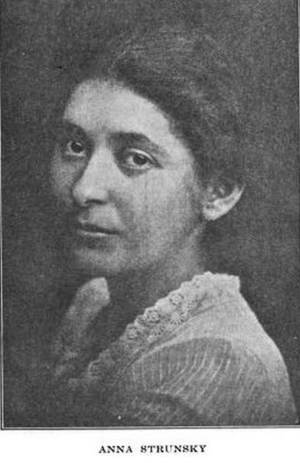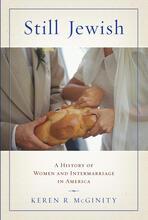Anna Strunsky Walling
Born in Russia in 1879, Anna Strunsky Walling fled Europe with her family, eventually settling in San Francisco. She became involved in the Socialist Labor Party in high school, beginning her lifelong commitment to socialist politics. After graduating from Stanford University in 1900, she published a novel with Jack London, the first of many literary works. Shortly before the outbreak of the Russian Revolution, she traveled in Russia, where she became engaged to American socialist and labor leader William English Walling. After her husband’s death, Anna edited a memorial volume on him, wrote her memoirs, was involved in many progressive organizations, and was committed to preserving the extensive correspondence she and her husband had with many important political and cultural figures.
Early Life & Socialist Activism
Anna Strunsky Walling, author, lecturer, and socialist activist, was born in Russia on March 21, 1879. The family fled Europe in 1893, so that Anna’s three older brothers would not be forced into Russian military service. Impoverished, Anna’s father Elias and mother Anna (Horowitz) Strunsky, daughter of Rabbi Lasser Horowitz, first settled for a few years in New York. They relocated to San Francisco when Anna was fourteen years old. Elias supported the family with his liquor business and placed a heavy emphasis on his children’s education.
During her last year in high school, fifteen-year-old Anna joined the American branch of the Socialist Labor Party (SLP). Reminiscing in a 1960 taped interview, she recalled the older members of the SLP thinking she was a bit young to become a socialist. She told them: “You are born a socialist. You are born with music, or poetry or painting or science. You can’t really become a socialist unless you’re born that way.” But she also attributed her early socialist ideas to the personal suffering her family had endured in Europe.
Relationship with Jack London
In December 1899, at an SLP celebration of the Paris Commune, Anna, then attending Stanford University, met the young writer Jack London. They spent a great deal of time together discussing social and political issues, and they were part of a wider group of San Francisco intellectuals known as “The Crowd.” Although at times it appeared Anna and Jack’s friendship might blossom into marriage, London surprised Anna by marrying Bess Maddern.
Anna graduated from Stanford in 1900. Three years later, she and London published a collaborative project anonymously—a novel in the form of letters, The Kempton-Wace Letters (1903). The book is devoted to a debate on the nature of love in which the woman correspondent, Dane Kempton, defines the ideals of love as romantic, while the man, Herbert Wace, contends love is essentially biological.
World Travels & Marriage
Between 1900 and 1905, she traveled to New York and England, attempted to write another novel, Windlestraws, and gave public lectures on Russian subjects. In 1905, she helped establish the group Friends of Russian Freedom in San Francisco. Just before the outbreak of the 1905 Russian Revolution, she traveled by herself to Vilna, Minsk, and Hommel. After visiting Hommel, she published an article of an interview she had held with General Orlov, who had recently perpetrated a pogrom against Jews in that city.
During this stay in Russia, she became engaged to William English Walling, an American socialist and labor leader. Walling’s maternal grandfather, William Hayden English, had been the Democratic vice presidential candidate in 1880 and an uncle served in Congress. His father, Willoughby Walling, a physician, had amassed a fortune in real estate, and his mother, Rosalind English Walling, was a member of the Daughters of the American Revolution. Although neither the Strunsky nor the Walling family was happy about the match because of religious and social differences, they were married in Paris in 1906, with Anna’s sister Rose and Jean Lonquet, Karl Marx’s grandson, as witnesses to a civil ceremony. Anna’s first child, born in 1908, died when only five days old. The following year she had a miscarriage. Between 1910 and 1918, Anna Walling gave birth to four children: Rosamond, Anna, Georgia, and William Hayden English.
In 1915, her novel Violette of Père Lachaise, which she had started ten years earlier, was published. It is the story of a young flower seller who becomes an actor involved in social revolution.
Walling’s political involvement in the socialist movement, her career in journalism, and her creative writing were curtailed by her household duties and the raising of her children. Meanwhile, her marriage began to falter. With the advent of World War I, Anna and William Walling developed seemingly irreconcilable political differences. While she concurred with the American Socialist Party’s view of the war, he broke with the party. While she was enthusiastic about the Russian Revolution, he was highly critical of the Bolsheviks. By the 1920s, the couple were also having serious financial problems. In 1932, William filed for a Mexican divorce, but Anna refused to recognize the end of the marriage. William Walling died in Amsterdam in 1936.
Later Life & Career

Socialist, co-founder of the NAACP, and author, Anna Strunsky and her sister Rose, circa 1902.
Image courtesy of Yale University Library via Wikimedia Commons.
During the last thirty years of her life, Anna Walling helped edit a memorial volume on her husband; she wrote memoirs about the Jack London years; she participated in Quaker social actions and followed the activities of the War Resisters League, the League for Mutual Aid, the American League to Abolish Capital Punishment, the League for Industrial Democracy, and the National Association for the Advancement of Colored People, which she and her husband had helped found. Her sense of respect for the socialist movement and its significance motivated her to preserve her own and her husband’s extensive correspondences with family, with friends, and with the wide array of important political and cultural people who had enriched their lives.
Anna Strunsky Walling died in February 1964.
AJYB 6, 1905. 199, 24: 211.
Kaplan, Diane, John Espy, and Jon Waldner, “Finding Aid for the Anna Strunsky Walling Papers.” Manuscripts and archives, 1880-1968, MS 1111, Yale University Library, New Haven, Connecticut.
“Anna Strunsky, 86, Poet and Lecturer.” New York Times., February 26, 1964.
Interview with Anna Strunsky Walling, 6 June, 1960, Oral History of the Left, Tamiment Library, New York University, New York, NY.
Bancroft Library, University of California, Berkeley.
Huntington Library, Pasadena, California.
WWIAJ, 1928 and 1938.
WWWIA 4.




